- Home
- Edward Rutherfurd
Russka: The Novel of Russia Page 8
Russka: The Novel of Russia Read online
Page 8
‘No matter.’ He got up. ‘You are right. He’s too young.’ The incident was closed.
Or almost. For just as he was leaving the Khazar’s house, he could not resist turning to ask his friend: ‘Tell me, what do you think of Ivanushka – his character?’
Zhydovyn had thought for a moment. He liked the boy. One of his own sons was a little that way.
‘He’s a dreamer,’ he said pleasantly.
As Igor rode home, he scarcely glanced at the red star. He was a sternly religious man and he had no doubt that God was sending a message. But it was his duty to suffer whatever would come, he supposed. Instead he thought of Ivanushka. ‘A dreamer’ the Khazar had said. He knew what his own brothers called the boy. Sviatopolk calls him a fool, he thought sadly.
And what could one do with a fool? He had no idea.
It was three days later that the red comet passed out of sight, and there were no more signs in the heavens that winter.
Spring. In the beginning of each year in this fertile country, water covered the land, and the water was the river. Kiev: city by water. They would see it in a moment. The long boat moved steadily down the broad, placid stream of the Dniepr. Four men pulled gently on the oars, guiding it towards the city. Ivanushka and his father stood in the stern, the tall man’s arm round the boy’s shoulder.
The boat, though it was twenty feet long, was hollowed out of a single massive tree trunk. ‘No trees,’ Igor told his son, ‘are as big as those in the land of Rus. A man with an axe can carve himself a small ship out of one of our mighty oaks.’ And it seemed to the boy, feeling his father close beside him, that in all his life, no morning could ever be more still and more perfect than this.
Ivanushka wore a simple linen shirt and trousers, over which he had pulled a brown woollen kaftan, since the morning was still cold. On his feet were green leather boots of which he was very proud. His light brown hair was cut short in the page boy style.
They had been upstream at dawn to inspect the traps where the men were fishing. Now, still early in the morning, they were returning to the city for breakfast. And after that … Ivanushka felt a tremor of excitement in his stomach. For this was to be the day.
He looked up at his father. How often he had seen him, on some vantage point high on the wooden walls above the river, gazing down like a silent eagle on the watery landscape far below. Standing in the stern of the boat now, wrapped in a long black cloak, tall and spare, one might indeed have supposed that Igor had only to unfurl his cloak in order to rise up into the sky and hover, high over the river and woods, before swooping upon some luckless prey.
How powerful his father’s arm was as it rested against his neck: not only with the strength of mere muscle, though. For when he was close to Igor, he sensed another strength that came from the past: haunting like an echoing memory, yet flowing into his being like a warm river. ‘You have the blood of mighty warriors in your veins,’ Igor had often told him. ‘Giants in battle, splendid horsemen like my father and his before him; our ancestors were strong before the Khazars came, in times when even the mountains were young. Remember, you are one with them; they are always with you.’ And then his heart would thrill when his father added: ‘And one day you too will pass all this on, to your sons and those who come after.’ This was what it meant to have a father and to be a son.
And today, he was sure, he would begin his career, following his elder brothers and his father, as a warrior, a bogatyr.
The monk would settle it all.
Softly the boat moved with the current. In the morning silence, the great river spread towards the south. The air was sharp, but still. Traces of mist remained upon the surface of the river whose huge, ceaseless movement was barely perceptible, thus creating a watery landscape that was always receding, yet motionless. As one looked south, grey-blue water and pale blue sky seemed to melt together at the horizon in a single, liquid softness, becoming indistinguishable one from another in the distance, while to the east the golden sunlight diffused in the haze.
They were coming in sight of the city now, and Ivanushka let out a little sigh. How beautiful Kiev was.
It sat on the right side of the river. On banks that rose steeply over a hundred feet above the water, and topped with high wooden palisades, it stretched for a couple of miles, overlooking – strong but secure – the gentle, placid landscape.
The city consisted of three principal sections. First, at the northern edge, on a modest tumulus, stood the stout old citadel. This contained the prince’s palace and the large church founded eighty years before by the Blessed Vladimir himself, the Church of the Tithes. Next, to the south-west and only separated from it by a small ravine, was the new citadel – a considerably larger area, built by St Vladimir’s great son, compiler of the Russian Law, Yaroslav the Wise. Outside this, and running down to the river, lay another, still larger area, also protected by wooden walls. This was the suburb – the podol – where the lesser merchants and artisans lived. And down by the river were the jetties where the cumbersome, masted boats were moored.
In the two citadels, many of the larger buildings were made of brick. In the podol, all but a few churches were constructed of timber. All around were pleasant broad-leaved woods, even on the high, steep slopes that fell to the river below.
Everywhere in the city, golden crosses bearing the extra diagonal bar that represented Christ’s footrest in the eastern churches, caught the morning sun; and the golden, shallow domes of the churches glowed. Indeed, the great city itself looked like some vast and gleaming ship floating upon the waters.
For at Kiev, although the right bank of the river was high and topped with palisades, the left bank was low; and here, as at countless other places in the Dniepr’s vast system, the river had flooded its banks. It lay, glistening over the fields, which received its water and its rich silt. Each spring, through this wonderful immersion, all things were made anew.
As the city came closer, the boy fidgeted. Recently he had been having growing pains in his knees. But above all, he could hardly contain his excitement.
For just the week before Igor had told him: ‘It’s time to decide what we shall do with you. I shall take you to see Father Luke.’
It was a tremendous honour. Father Luke was his father’s spiritual counsellor and Igor never took a major decision without going to see him. When he spoke of the old monk, he would lower his voice in respect, for ‘The old monk knows all things,’ he would declare. And he always went to see him alone. Even Ivanushka’s two elder brothers had never been taken to see him. No wonder then that Ivanushka had blushed, and then gone pale when his father had told him.
Again and again, he had already pictured the scene. The kindly old man – tall, with a richly flowing white beard, a broad, seraphic face, eyes like suns – would see at once he had before him a young hero; would rest his hands in a blessing upon his head and declare: ‘It is God’s will, Ivan, that you shall be a noble warrior.’ This was how it would be. He gazed first at his father, then towards the rampart, with happy trust.
And Igor looked at his son. Was he doing right? It seemed to him that he was, and yet he was going to betray him.
How handsome his family was. It gave him a thrill of happiness just to look at them. They were in the main room of the big wooden house. Light was streaming in through the windows which were made not of glass but of the translucent silicate, found in local rocks, called mica. The light also caught the yellow clay tiles on the floor, so that the room seemed flooded with light.
On the table lay the remains of breakfast. By one wall was a large stove; in the corner opposite hung a little icon of St Nicholas with a small clay lamp hanging from three silver chains in front of it. On a chest on the right side of the room stood two large copper candlesticks, gleaming dully. The wax candles in them were, for the present, unlit. In the centre of the room, in the heavy carved oak chair that had been waxed and polished until it shone like ebony, sat his mother.
�
��Well, Ivanushka, are you ready?’ He was ready. He gazed at her joyfully.
A rich, deep pink brocade gown fell to her ankles. Her girdle was sewn with gold. The sleeves of her gown were wide, and the slender arms that emerged from them were encased in white silk. On one wrist she wore a bracelet of silver, set with stones – green amethysts from Asia, warm amber from the Baltic north. Her pendant earrings were set with pearls. From her slim neck hung a golden crescent on a chain. Thus did the noblewomen of Rus dress themselves, like the Grecian ladies of imperial Constantinople.
How pale her broad brow was; how elegantly her hand rested on the carved lion on the arm of the chair, her long fingers with their golden rings gracefully pointing downwards. How sweet her face was, how kind. Yet, as she gazed at him, it seemed somehow sad. Why was she sad?
His two brothers were there as well. They were both dressed in gowns, with rich belts and handsome sable collars: Sviatopolk, with his pale and lovely Polish bride, and Boris. He tried to love them equally; but though he admired them both, he could not help being a little afraid of Sviatopolk. People said Sviatopolk was the image of his father: yet was he? For while Igor often had a distant and reserved look in his eyes, there was something in Sviatopolk’s face that was secretly angry, bitter. Why should that be? And though both brothers would occasionally cuff him, when Sviatopolk hit him, it always hurt just a fraction more than he had expected.
On his father’s instructions, Ivanushka wore only a simple linen shirt and trousers – the long shirt hanging outside and held in with a belt. Somewhat against his mother’s will, he had been allowed to keep on his favourite green boots. But his face and hands had been thoroughly scrubbed in the big copper basin that stood on the washstand.
Igor, too, was similarly dressed, his shirt only distinguishable from that of a peasant by the fineness of the embroidery at the edges. ‘For rich ornament is not fitting, up there,’ he would say severely. Ivanushka’s eyes were shining. He had been too excited to eat more than a little bread and oatmeal porridge called kasha. Now, kissing his mother and his brother, he ran out and moments later, mounted on his pony, felt the cool, damp morning air on his cheek as he clattered into the street.
It was muddy. The houses of the nobles were mostly large wooden structures on one or two floors, with tall wooden roofs like tents and outbuildings behind. Each was in the middle of a small plot of ground enclosed by a stake fence; and these plots were, at present, so sodden from the melted snow and spring rain that planks had been laid on the path from the outer gate to the stables. The street outside was boarded in some places too, but where it was not, the horses’ hoofs almost disappeared into the mud.
Ivanushka, on his grey pony, rode respectfully behind his father. The nobleman was a splendid figure: a simple black cloak hung from his shoulders over his white shirt, and Ivanushka stared at his proud, straight back with boundless admiration. The jet-black horse that Igor rode was his finest. The ancient imperial name it bore had undergone a slight modification in its passage across the generations into Slavic: it was called Troyan.
The simple folk that father and son passed put their right hand on their heart and bowed from the waist; even the robed priests inclined their heads respectfully. For Igor was a muzh – a nobleman. The blood-money to be paid if he was killed was forty silver grivnas, whereas killing a free peasant, a smerd, cost a fine of only five.
Even the names of the ruling class were often different. The princes, and a few of their greatest retainers, frequently bore the ‘royal’ names that ended in slav, meaning praise; or mir, world. Such, for instance, were the great Vladimir and his son Yaroslav. For the nobility, Scandinavian names like Riurik or Oleg were still quite often used. Even Igor’s wife, though of noble Slav family, bore the name Olga, the Russian version of the nordic Helga. A peasant, on the other hand, would probably bear some simple old slavic name like Ilya, or Shchek, or Mal.
But it was a special form of address that marked out the noble beyond doubt. For while a peasant might be plain Ilya, a noble also added his father’s name, his patronymic. Thus young Ivan was called Ivan, son of Igor: Ivan Igorevich. And the three brothers might be referred to as ‘sons of Igor’ – the Igorevichi. For Igor was not only a noble: he was a valued member of the druzhina of the Prince of Kiev himself.
There were many princes in the land of Rus. Each of the trading cities on the great river routes had a prince as its protector, and all of them were descendants of the norseman named Oleg who had taken Kiev from the Khazars two centuries before. At the moment, the greatest cities in the vast river-trading empire were in the hands of the sons of the last prince of Kiev, the mighty Yaroslav the Wise. The sons of Yaroslav had organized the succession by rote – the eldest brother taking the greatest city, Kiev, and the rest taking the lesser cities by order of seniority, and owing obedience to the eldest. Thus while Igor’s master was now the senior, or Grand Prince of Kiev, the city of Chernigov, to the north, was in the hands of his younger brother Svyatoslav; careful Vsevolod, younger still, held smaller Pereiaslav in the south. If one of the brothers died, he was succeeded not by his son but by his next brother, so that all the younger brothers in the pecking order would move up to a greater city.
Igor served the Prince of Kiev himself. Indeed, he was almost in the inner council. Ivanushka’s brothers, too, were already in the outer druzhina, although Boris was still only a page; and it thrilled Ivanushka to think that soon he too would follow them.
‘Dismount!’ His father’s curt voice cut into the boy’s reverie and he started. They had only gone a few hundred yards, but Igor had already swung out of his saddle and was striding away; and as Ivanushka looked up, he saw why. They had reached the cathedral. He sighed. He dreaded the cathedral.
The walled citadel of Yaroslav the Wise contained many fine buildings. Besides the handsome wooden houses of the nobles, there were monasteries, churches, schools, and a splendid gateway – the Golden Gate – built in stone. This gateway was especially fine because on top of it, soaring up into the sky, stood the little golden-domed Church of the Annunciation. But nowhere in all the lands of Rus was there anything as magnificent as the great cathedral that rose before him now. For just as his father, the Blessed Vladimir, had built his great Church of the Tithes in the old citadel, so Yaroslav had begun his own huge cathedral in the new one.
He called it St Sophia: what other name would do, when everyone knew that the greatest church in the Eastern Roman Empire, the seat of the Patriarch in Constantinople, bore that sacred name? St Sophia, the Holy Wisdom of the Greeks.
For though this new northern nation might proudly declare, ‘We are the Rus,’ it was the civilization of the Greeks that they copied. The senior priests were mostly Greek. Even the one Slav, the mighty preacher who had headed the Russian Church a decade ago, had taken the Greek name of Hilarion. When noble children were baptized, they took a second, Christian name to complement the Slav or Scandinavian names they mostly bore. Thus a Yaroslav or a Boris would also carry a Christian name like Andrei, Dimitri, Alexander or Constantine. And all these names were Greek.
How huge the cathedral was. It was built of red granite, laid in long thin strips and fixed with almost equal layers of pink cement. It rose up a massive, rather square, red and pink block, a holy fortress designed to impress upon all the people the might of the newly adopted Christian God. Upon its centre sat a great burnished dome, in the shape of a flattened helmet – like that of the church in Constantinople – and around it were grouped twelve smaller domes. ‘They stand for Our Lord and the twelve disciples,’ Igor had told his son. The cathedral was almost finished. Only a small scaffolding on one side showed where work was still being done on the outside staircases. With a shiver Ivanushka stepped inside.
If the outside was like a fortress, the high, broad, gloomy spaces within seemed as vast as the universe. In the manner of the great churches of the Roman Empire, it proceeded from west to east in a broad line of five naves – a wide central
nave, with two more on each side. At the eastern end were five semi-circular apses. At the western end, high above the floor, were galleries where the princes and their courtiers gathered to pray, looking down upon the people. And at the centre of the church, under the huge dome, was the great airy space where the priests in their shining vestments stood before the congregation and heaven met the earth.
But it was not the high dome, nor the five naves, nor the massive columns that dominated the cavernous interior. It was the mosaics.
They made Ivanushka tremble. From floor to distant ceiling they covered the walls. The Blessed Virgin with hands outstretched in the eastern attitude of prayer; the Fathers of the Church; the Annunciation; the Eucharist: in blues and browns, in reds and greens, against the background of shining gold, these awesome, august figures stared down upon the world. Enormous, pale, oval faces with dark hair and huge, black eyes gazed mournfully yet impersonally from their golden setting upon the little people in the passing world. And highest of all, the Pantokrator, creator of the world, gazed from the central dome, his large Greek eyes seeing all, seeing nothing – knowing all men yet unknowable, beyond all earthly wisdom.
Earth met heaven in the church; hundreds of candles flickered in the gloom; and upon the walls the golden mosaics glowed, their great and terrible light shining in the darkness of the world.
Some priests were chanting.
‘Gospodi pomily.’ Lord have mercy. They sang in Church Slavonic – a nasal version of the spoken tongue that was both understandable but mysterious, hieratic.

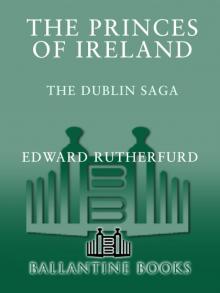 Princes of Ireland
Princes of Ireland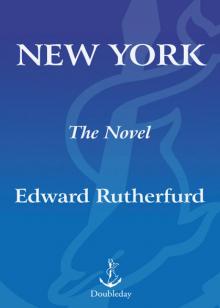 New York
New York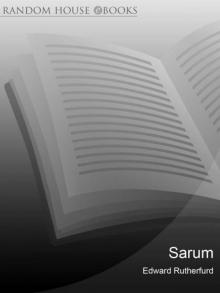 Sarum
Sarum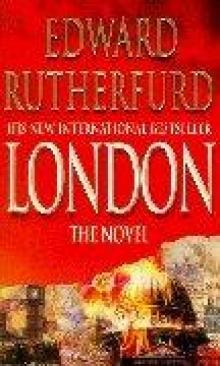 London
London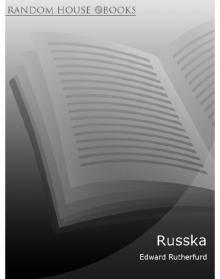 Russka: The Novel of Russia
Russka: The Novel of Russia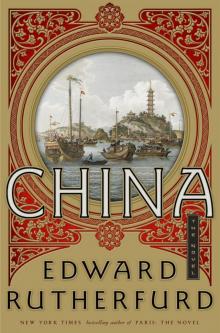 China
China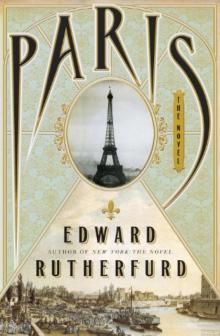 Paris
Paris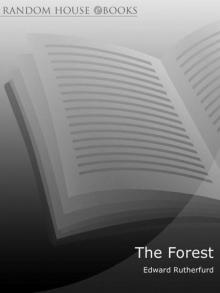 The Forest
The Forest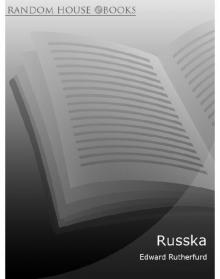 Russka
Russka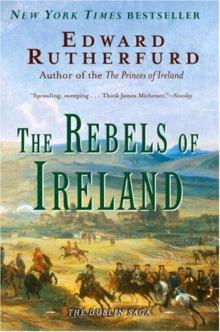 The Rebels of Ireland: The Dublin Saga
The Rebels of Ireland: The Dublin Saga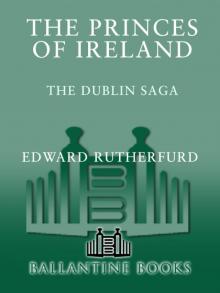 The Princes of Ireland
The Princes of Ireland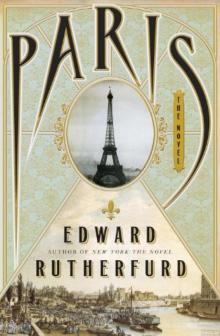 Paris: The Novel
Paris: The Novel